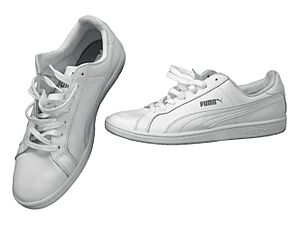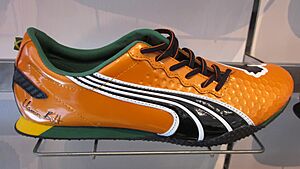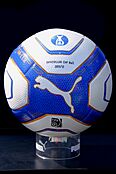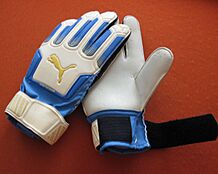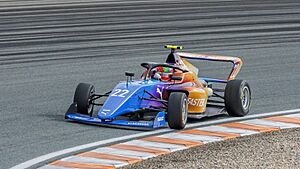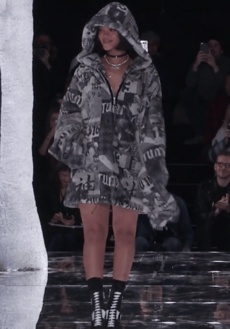Puma (brand) facts for kids
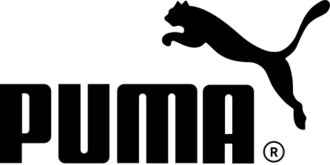 |
|
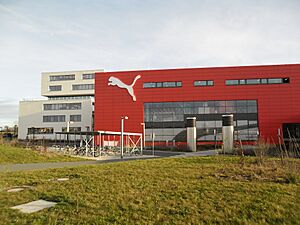
World headquarters in Herzogenaurach
|
|
| Public (SE) | |
| Traded as |
|
| Industry | |
| Predecessor | Split from Dassler Brothers Shoe Factory |
| Founded | 1948 |
| Founder | Rudolf Dassler |
| Headquarters | Herzogenaurach, Bavaria, Germany |
|
Area served
|
Worldwide |
|
Key people
|
|
| Products |
|
| Revenue | |
|
Operating income
|
|
| Total assets | |
| Total equity | |
| Owners |
|
|
Number of employees
|
|
| Subsidiaries |
|
Puma SE is a German company that designs and makes athletic and casual shoes, clothes, and accessories. Its main office is in Herzogenaurach, Germany. Puma is one of the biggest sportswear makers in the world.
The company was started in 1948 by Rudolf Dassler. Before that, in 1924, Rudolf and his brother Adolf "Adi" Dassler had a shoe factory together called "Dassler Brothers Shoe Factory." The brothers later had disagreements and decided to split their business in 1948. This led to the creation of two separate companies: Adidas and Puma. Rudolf first named his new company Ruda, but he soon changed it to Puma. Puma's first logo, registered in 1948, showed a square with a wild cat jumping through a "D". Today, Puma's shoes and clothes feature the Puma logo and a special "Formstrip" design, which was first used in 1958.
Contents
The Story of Puma
How it All Started
Rudolf Dassler's father worked in a shoe factory, and his mother ran a small laundry business. After finishing school, Rudolf joined his father at the shoe factory. Later, he learned about sales and leather trading.
In July 1924, Rudolf and his younger brother, Adolf, started their own shoe factory. They called it "Dassler Brothers Shoe Factory." At that time, it was the only business making sports shoes. They began their work in their mother's laundry room. Sometimes, they even had to use a stationary bicycle to power their machines because electricity was not always available. In 1927, they moved into their own building.
The brothers became well-known when they brought their special shoes to the 1936 Summer Olympics in Berlin. They convinced American sprinter Jesse Owens to wear their shoes. Owens won four gold medals, which helped their business grow a lot. Before World War II, the Dasslers were selling 200,000 pairs of shoes every year.
During World War II, the relationship between the brothers became difficult. In 1943, during an air raid, a misunderstanding happened in a bomb shelter. This event made the brothers trust each other less. Later, when Rudolf was questioned by American soldiers, he believed his brother had reported him.
The Brothers Split and Puma is Born
Because of their different ideas on how to run the business, the brothers decided to split in 1948. Rudolf moved to the other side of the Aurach River to start his own company. Adolf started his company, Adidas, using parts of his nickname "Adi" and his last name "Das." Rudolf named his new company "Ruda" at first, using parts of his name. A few months later, he changed the name to Puma Schuhfabrik Rudolf Dassler.
After the split, Puma and Adidas became strong rivals. The town where they lived, Herzogenaurach, was even divided by this rivalry. People would often look down at strangers' feet to see which brand of shoes they were wearing.
In the first football match after World War II in 1948, some players from the West Germany national football team wore Puma boots. Rudolf also created a special football boot with screw-in studs, called the "Super Atom."
Puma at the Olympics and World Cup
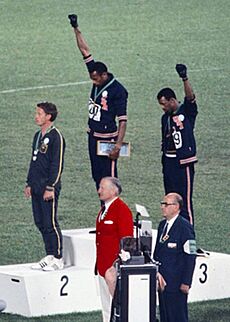
At the 1952 Summer Olympics, Josy Barthel from Luxembourg won Puma's first Olympic gold medal in the 1500 meters race.
At the 1960 Summer Olympics, Puma paid German sprinter Armin Hary to wear their shoes in the 100-meter sprint final. Hary won a gold medal wearing Pumas.
During the 1968 Olympics Black Power Salute, Puma-sponsored athletes Tommie Smith and John Carlos won gold and bronze medals in the 200 meters. They stood on the podium with their Puma Suede shoes in hand and raised their fists in a silent protest for human rights.
Before the 1970 FIFA World Cup, Rudolf's son, Armin Dassler, and Adi's son, Horst Dassler, made an agreement called "The Pelé Pact." They agreed not to try to sign Pelé, the world's most famous athlete, because they thought it would be too expensive. However, Puma broke this agreement and signed Pelé.
Puma paid Pelé to tie his shoelaces just before Brazil's quarter-final game against Peru. This simple act, caught on camera, showed the Puma King boots to a huge global audience. This was a very smart marketing move for Puma. The rivalry between Puma and Adidas helped turn sports clothing into a very successful industry.
At the 1972 Summer Olympics, Puma provided shoes for Ugandan champion John Akii-Bua. Later, Puma even employed Akii-Bua in Germany when he had to leave Uganda.
In 1973, Puma launched the Puma Clyde, a basketball shoe designed for player Walt "Clyde" Frazier. This shoe became very popular in different youth cultures.
Becoming a Public Company
Puma became a public company in 1986, meaning its shares could be bought and sold on the stock market. It made its first profit since then in 1994. In 2001, Puma bought the Scandinavian Tretorn Group, but later sold it in 2015.
In 2007, a French company called PPR (now Kering) bought a large part of Puma. By July 2007, PPR owned more than 60% of Puma's stock. In 2008, Melody Harris-Jensbach became a top executive, and designer Hussein Chalayan became creative director.
Puma from 2010 Onward
In 2010, Puma bought Cobra Golf. The company also changed its legal structure in 2011, becoming Puma SE. Jochen Zeitz, who had been the CEO for a long time, became chairman, and Franz Koch took over as CEO. Since July 2013, Bjørn Gulden has led the company. Arne Freundt became CEO in November 2022.
In April 2025, Puma announced that Arne Freundt would step down as CEO. Arthur Hoeld, a former Adidas executive, is expected to take over on July 1, 2025.
Puma's Money Matters
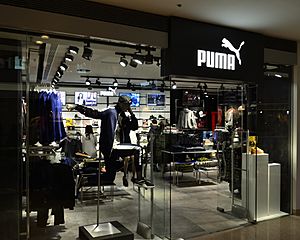
Puma has been a public company since 1986, listed on the Frankfurt Stock Exchange. A French luxury group called Kering owns a part of Puma.
Puma is one of the top shoe brands, along with Adidas and Nike. It employs more than 18,000 people around the world. Puma has offices globally, including major hubs in Somerville, Massachusetts; Hong Kong; Ho Chi Minh City, Vietnam; and its main headquarters in Herzogenaurach, Germany.
| Year | 2013 | 2014 | 2015 | 2016 | 2017 | 2018 | 2019 | 2020 | 2021 | 2022 | 2023 |
|---|---|---|---|---|---|---|---|---|---|---|---|
| Revenue | 2,985 | 2,972 | 3,387 | 3,627 | 4,136 | 4,648 | 5,502 | 5,234 | 6,805 | 8,465 | 8,601 |
| Net Income | 5 | 64 | 37 | 62 | 136 | 187 | 262 | 79 | 310 | 353 | 304.9 |
| Assets | 2,309 | 2,550 | 2,620 | 2,765 | 2,854 | 3,207 | 4,378 | 4,684 | 5,728 | 6,772 | 6,640 |
| Employees | 10,750 | 10,830 | 11,351 | 11,495 | 11,787 | 12,894 | 14,332 | 14,374 | 16,125 | 18,071 | 18,681 |
Puma uses social media to connect with customers and make more people aware of its brand. When people know more about Puma and like the brand, they are more likely to buy its products.
Puma also helps its suppliers by offering early payments on invoices. This helps suppliers with their money flow and reduces costs. Puma uses a digital platform to make this process smooth and transparent.
Puma's Sponsorships
Many famous football players wear Puma boots, including Neymar, Antoine Griezmann, Marco Reus, Raphael Varane, Luis Suárez, Sunil Chhetri, Christian Pulisic, and Dani Carvajal.
Puma owns a small part of the German football club Borussia Dortmund and has been their supplier since 2012. Puma has also partnered with many other football clubs like Manchester City F.C., AC Milan, and Olympique de Marseille. They also sponsor national football teams such as Ghana, Ivory Coast, and Switzerland. Puma footballs are the official ball for top leagues in Italy, Spain, and Scotland. Starting in the 2025–26 season, Puma will also provide the match ball for England's Premier League.
Some groups have raised concerns about Puma's past sponsorships. Puma ended its sponsorship of the Israel national football team in 2024.

In track and field, Puma sponsors many Olympic committees and athletics associations, including those in Jamaica and Switzerland. They sponsor athletes like Karsten Warholm, Shericka Jackson, Mondo Duplantis, and Elaine Thompson-Herah. Several world records have been set by athletes wearing Puma shoes, including by Usain Bolt.
In 2018, Puma returned to basketball after almost 20 years. They appointed Jay-Z as the creative director for their basketball division. Players like Marvin Bagley III and Deandre Ayton joined Puma's basketball team. In 2021, Puma launched High Court, its first women's basketball line.
Puma also partners with netball teams, like the Melbourne Vixens, and is the official sponsor for New Zealand's national netball team, the Silver Ferns. Golfers like Rickie Fowler and Lexi Thompson use equipment from Puma's golf brand, Cobra Golf. Puma has also sponsored cricketers such as Virat Kohli and Rashid Khan.
Puma is a major maker of driving shoes and race suits for motorsports. They work with brands like BMW, Ducati, and Ferrari. In Formula 1, Puma provides gear for teams like Scuderia Ferrari, Aston Martin Aramco, and Williams. In 2024, Puma became an official partner of F1 Academy. The company also sponsors BMW, Mercedes, and Porsche in their motorsports activities.
Many celebrities have partnered with Puma. Rihanna became the creative director for Puma's women's clothing line in 2014. Later, Puma worked with The Weeknd and Selena Gomez. In 2019, Big Sean became a Puma brand ambassador. Puma also partnered with NBA athlete LaMelo Ball in 2020 to create a line of products.
In 2024, Milind Soman became Puma's running ambassador. Also in 2024, singer Sekou and singer Rosé became brand ambassadors for Puma.
Working Conditions and the Environment
Fair Working Conditions
Puma started checking all its suppliers every year in 2000 to make sure they follow good working conditions. They also share these results in their reports. Since 2005, Puma has publicly listed its suppliers.
Puma works to improve working conditions in its factories around the world. They have addressed concerns about conditions and aim to ensure fair treatment for all workers.
Caring for the Environment
In 2011, Puma was recognized as one of the first major companies to measure its environmental impact. Puma has promised that half of its international collections will be made using sustainable methods within four years. This means using more recycled materials and making sure suppliers develop eco-friendly products.
Puma also encourages good environmental practices in its supply chain by offering financial rewards to suppliers who perform well in sustainability. This system helps Puma reduce its carbon emissions by using more eco-friendly materials. This effort won them an "Innovation Award" in 2016.
Between 2017 and 2021, Puma reduced its own carbon emissions worldwide by 88%. They did this mainly by buying renewable energy.
In 2023, Puma announced it would stop using kangaroo leather in its products. Its redesigned KING football boot now uses at least 20% recycled material. Also in 2023, Puma launched "Voices of a Re:Generation," a new project to get ideas from young people (aged 12-30) on how to make the brand more sustainable. This initiative includes young activists who work to make sustainability clearer and more appealing to their generation. Puma's focus on the environment matches what many young people care about.
In January 2024, a report on fashion and energy named Puma the 'most sustainable brand.' It noted Puma's high sustainability rating, clear information, and low carbon footprint from its website.
Images for kids
See also
 In Spanish: Puma (marca) para niños
In Spanish: Puma (marca) para niños
 | John T. Biggers |
 | Thomas Blackshear |
 | Mark Bradford |
 | Beverly Buchanan |


